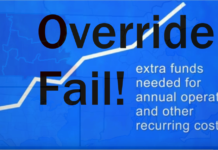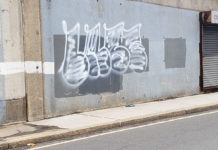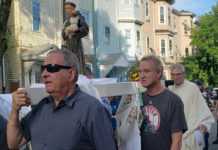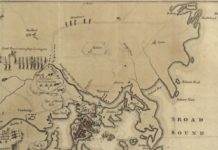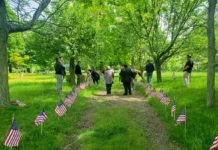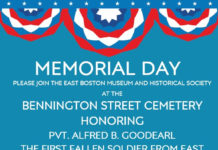by FRANK CONTE
A great man no longer walks among us.
John White passed away last week at the age of 87 after a long illness at his daughter’s home in Syracuse, New York.
For decades, John White was the executive director of the East Boston Area Planning Action Council, the place we all went to get help of some kind. John was a friend to many, a devoted family man and an individual who put his Catholic faith into action day after day.
His work never went without notice and he never asked for anything in return. Folks like him made the neighborhood work. What he did get in return was the love and admiration of hundreds of friends. One of the many lessons we learned from John’s life is that that true wealth is to the beloved of many friends.
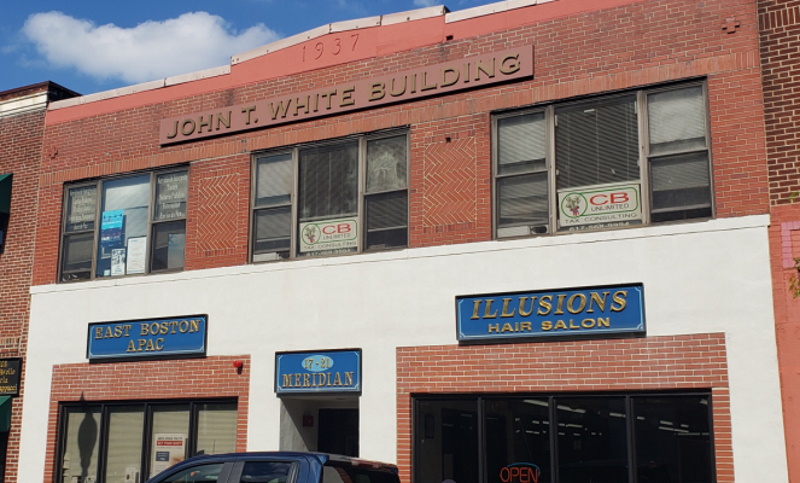
We loved John and he loved us back.
Many this week are heartbroken to hear the news. The death of a loved one always comes hard but John’s is an especially hard one to take and I’m not alone feeling this way.
John White loved people no matter their background, their size, their outlook or their baggage. It was not his calling to be a lawyer, a businessman or a politician. He certainly gave up promotions to remain in East Boston. John’s mission was social work performed with great empathy, improvisation and creativity.
He kept two offices: one, a cluttered office inside 21 Meridian Street with yellow pads and a poster of James Michael Curley and the other across the whole peninsula known as East Boston. For those of us who knew him well, John figured that the action wasn’t always behind a desk, but on the streets he roamed so well. Streets that took him to court houses, doctor’s offices, utility companies, boys and girls clubs, drug rehab programs, elderly homes, board meetings, halfway houses and food kitchens, and every isolated place where he knew there was a voice crying out for help.
John kept in his breast the neighborhood spirit he inhaled from the early days as a kid on London Street to his last days on Meridian Street, hard by Maverick Square, where he would start each day. A veritable Mister Fix-it who never moved far away.
Although some modest prosperity availed a move to a home in Winchester, John never left East Boston from sunrise to beyond sunset. Even as he battled adversity in his last days in Syracuse, John’s thoughts were with his old neighborhood friends.
“Please give my regards to your mother,” he said, always putting a fine point at the end of a conversation.
It wasn’t a surprise to hear that John would make calls from New York on behalf of some client lost in the drift of bureaucracy. Faithful until the end.
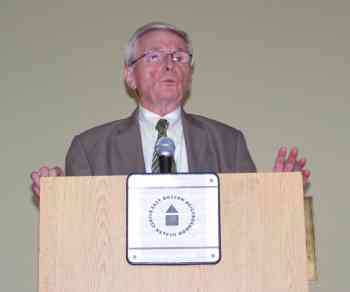
One of John’s greatest gifts was his ability to listen as if he took the philosopher Zeno’s advice, “We have two ears and one mouth, so we should listen more than we say.” And so, John listened, he empathized and with amazing grace he took action.
John’s talent was that he would take the time to get to know people and, in turn, how to help. For good reason, John would take great care to advocate on behalf of anyone who had the bad luck of dealing with a heartless public or private bureaucracy. If there was any time that “got his Irish up,” it was when he raged against the indifference of technology toward the elderly who were never in a position to fill out applications on a computer, if they had one. John was the human that you wanted to hear on the other end of the phone line if you needed help; but not the voice you wanted to hear if you were some technocrat making excuses for the way things are.
In East Boston, we learn that relationships grow closer as we all live the same experiences over time. The roster of individual personalities that weave easily and uneasily with each other make East Boston a great community. John was part of that. He had the patience to listen to all sides of an argument — and of arguments there were many. But John had to the tact to hear you out; in other words, he let you vent at the outrage of the day.
Over 40 years, my relationship with John flourished. He took great interest in my work and offered encouragement. He always wanted to know about my current projects. He loved a Mother’s Day column (no surprise) and I was lucky to never have heard, “I have a bone to pick with you…”
I would often check his office to say hello as I rushed to catch the train at Maverick Station and often, he would insist — like a principal reprimanding a student on detention — for me to sit in his office. He would clear his desk and the great conversations would begin.
It was then I figured that the world of work could wait.
Our many conversations were certainly about the broad strokes of life: the virtues of introducing one’s children to Shakespeare, the decline of the humanities, whether the Catholic Church could reform itself, what little I knew of classical music, why he loved musicals, the nickel and diming of the working class, the shortcomings of our health care system, Machiavelli and the Renaissance, the decline in the art of writing, the criminal justice system, the vocational education system, the joy of brothers and sisters, the therapeutic state, Italian cooking (he knew it well), modern poetry, modern music, the classical Greco-Roman world, Boston College (his alma mater), a history of the Jesuits, the importance of a civics education, and where welfare may have gotten off the tracks and why caring for the poor should weigh heavily as a responsibility.
But of all our conversations there was one which animated John the most: “the care of the soul.” It wasn’t just satisfying the material needs of his neighbors. There was, in my opinion, a spiritual dimension to John’s work. I saw this in how he looked after my godfather and his lifelong friend, John Cuono, his former teacher. But my godfather was just one of many hundred souls.
Well, how did I really, really know about this spiritual dimension? I only had to look on the mosaic of prayer cards of the dearly departed on the door his office, perhaps a hundred of them or more forming a one-of-a-kind shrine. Among them were Sal, Josie, Millie, Mary B., Sophie, Betty, Gracie and far too many to mention here. In his lifetime, John attended many wakes and funerals, paying final respects to those who walked through his door. John would never forget. The people on those prayer cards lived with him every day and they spoke to John about the great days, the great deeds and the great purpose of a life well-lived and the importance of friendship.
John would also often talk about his friendship with the late Michael Laurano, our great under-acknowledged oral historian. Toward the end of a day’s work — or any time he needed a break — John would visit Michael’s office down the street to talk over the issues of the day. In one of my last telephone conversations with him, John recalled how special those encounters were to him. You could only wish to be there to take in all the insight in that room.
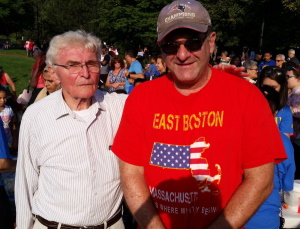
There was nothing as central to John’s being as his love for his wife, Eva with whom he raised two daughters. His love was eternal and stronger in the face of Alzheimer’s disease which ravaged her memory. Yet John carried on to the end — bearing the burden of a caregiver knowing that something so precious was about to leave his world. He wondered if there would ever be a cure for such a disease. I guess it’s up to us to carry John’s hope forward.
Certainly, John knew joy. And I found one small way to call up that joy. John once told me that he was a great fan of the Catholic writer James Carroll and was particularly moved by his memoir, An American Requiem: God, My Father, and the War That Came Between Us. At the time, Jim was about to leave his position as Distinguished Scholar-in-Residence at Suffolk University where I worked. I never ran into Jim at Suffolk but I decided to do something special. During lunch I ran down to a used bookstore (the kind John and I would rhapsodize about) and picked up a used copy of the critically-acclaimed Constantine’s Sword. I dialed up Jim to ask him a favor, explaining that a huge fan would greatly appreciate a signed copy of his work. Jim ever-gracious signed the book, “To John…” The next time I saw John, I gave him the book and showed him Jim’s signature. As expected from a lover of books, John was ecstatic. He said “Come here give me a hug.” I’ll never forget that embrace.
We could all use some of that now.
Scholars far and wide ask, “Where shall wisdom be found?”
Like many, I found it in a humble man with the greatest heart in an office on Meridian Street in a great neighborhood.
On the wings of angels, go John; go to the house of the Lord.
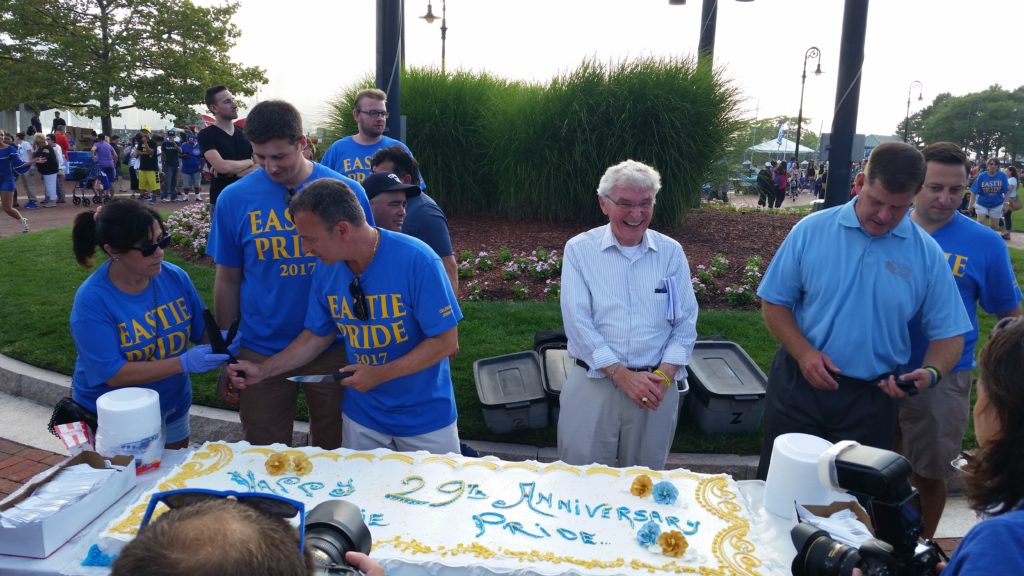
Originally published June 15, 2022
Modified June 16, 2022
Related:



